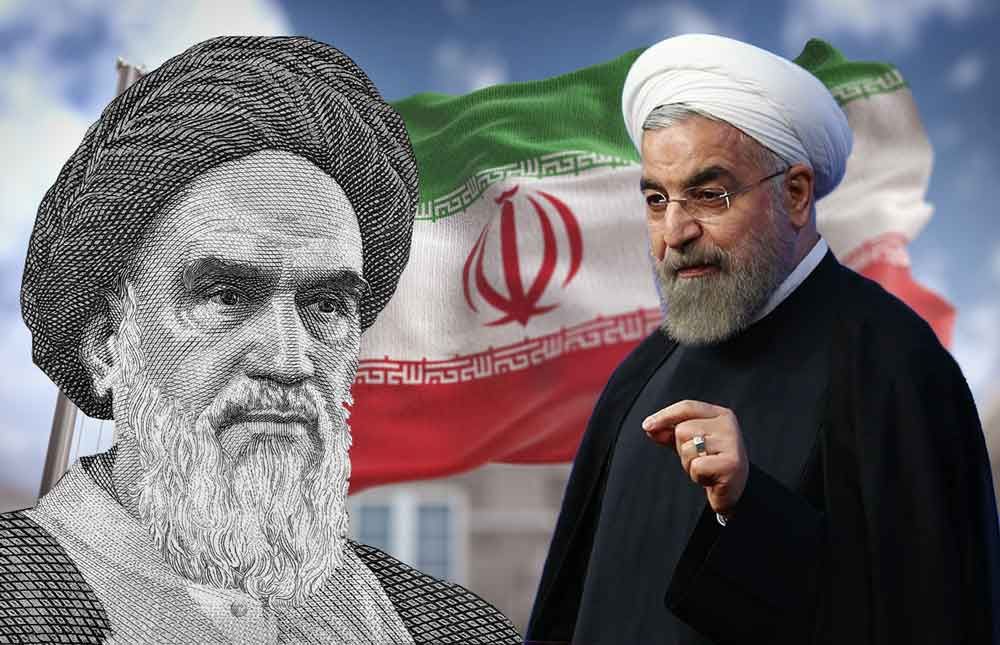As the Iranian nuclear deal loses a crucial backer, is it in danger of disintegration?
By Ariane Tabatabai | August 3, 2016
 Supreme Leader Ayatollah Ali Khamenei and Iran President Hassan Rouhani
Supreme Leader Ayatollah Ali Khamenei and Iran President Hassan Rouhani
Iran’s most powerful figure, Supreme Leader Ayatollah Ali Khamenei, played a vital role in making sure his country’s diplomatic efforts to reach an agreement on its nuclear program were successful. More than a year after the deal was signed in Vienna, though, Khamenei is increasingly distancing himself from it, this week issuing his harshest criticism yet. In other words, the nuclear deal may be losing its most powerful advocate in Iran, who until now was able to shield moderate President Hassan Rouhani, whose government negotiated the agreement, from critics.
Khamenei holds the highest office in Iran. Generally a conservative, he came out as a cautious proponent of the nuclear talks between Iran and six world powers, much to many observers’ disbelief, as I wrote in early 2015. While he kept warning Iranians that the United States couldn’t be trusted, he also endorsed the talks and helped protect the negotiators. With Khamenei’s support came that of many key figures and institutions. For example, even the powerful Revolutionary Guards offered their cautious endorsement. For more than two years, as the marathon talks dragged on and critics became impatient, Khamenei continued to shield the negotiators. Without his support, small but vocal groups of critics in Iran could have derailed the process a number of times.
Today, it seems increasingly clear that Khamenei is no longer willing to play ball. In recent weeks, he has slowly but surely taken a more critical position. In June, one month before the first anniversary of the deal’s signing, he said that his country would continue to abide by it—but also threatened to “set fire” to the agreement if the United States tore it up, as so many US presidential candidates pledged to do throughout their primary campaigns.
On Monday, in a nationally televised speech, he went further. Khamenei accused (link in Persian) the United States and its diplomats of acting deceptively by playing nice in public, while leading a campaign behind the scenes aimed at undermining Tehran. In short, he blamed Washington for failing to uphold its end of the bargain and violating the deal. He reminded his base that he warned against trusting the United States throughout the talks and said that “some” hadn’t wanted to accept the warning, perhaps a veiled reference to the moderates who pushed for engagement with Washington.
In his Monday speech, Khamenei pushed back against the idea that it’s too early to take stock of the deal, which was signed in July 2015, and, after a series of initial requirements were met, entered its implementation phase in January 2016. Referring to the nuclear agreement by its Persian acronym, BARJAM, he said:
“Six months have passed … there has been no concrete or distinct impact on people’s lives, even though, well, BARJAM was to remove sanctions, to remove these unjust sanctions. Isn’t it so? Well, they haven’t been removed. Now, they say, progressively, little by little, it will be solved! Who’s talking about little by little? … The other day, the officials told us, and the people, that in the negotiations the deal is that when Iran does its part, all the sanctions will be removed at once … Now, it’s been six months, they haven’t been removed; is six months a short amount of time for a nation of 80 million?”
Khamenei also returned to a topic he first broached months ago when he said the talks were a “test” that would tell Iran whether it could expand negotiations with the United States (leader of the other parties to the deal) into additional areas. “This BARJAM became an example, an experience, for us… Now the Americans say, come talk about regional issues,” he said, referring to the growing instability in the Middle East stemming from the Saudi Arabia-Iran split, the war in Syria, and the Islamic State. He went on to say that the experience of having done a deal with the United States shows that doing so again would be “a killer poison.”
While it may seem like Khamenei was going on yet another baseless anti-American rant, he was actually capturing the growing frustration of the broader Iranian public, which has not yet seen tangible results from the many months of negotiations. When the deal was signed, the Iranian public had high hopes: They saw dozens of international delegations rush to their country to sign hundreds of memorandums of understanding. But six months after Iran began to receive sanctions relief, those memorandums haven’t turned into actual deals. Moreover, while Washington has not technically violated the terms of the nuclear agreement, it has kept non-nuclear sanctions in place and passed new ones aimed at curbing financial dealings with Iran. Even the most concrete benefits Iran should receive under the deal, like new civilian aircraft to replace its aging fleet, have come under attack in Washington. To be sure, not every anti-Iran bill proposed by US members of Congress will pass, but they still rattle companies thinking of doing business with Tehran.
Following Khamenei’s speech, on Tuesday Rouhani did his first live interview on national television since March, in which he attempted to sell his chief foreign policy achievement yet again. He tackled a number of questions about the nuclear deal, the economy, and other challenges, and tried to offer a more positive spin on the situation. He argued that the nuclear deal has been a positive development, creating a more open environment for the country both economically and politically. Reiterating points made in his team’s first quarterly progress report on the deal, Rouhani was fairly balanced in his discussion of the nuclear agreement, noting that there were challenges stemming from the United States, but also from Iran itself. He put a new twist on some of Khamenei’s comments as he tried to sell his own agenda to the public while at the same time presenting himself as in line with the country’s highest authority. Khamenei wants to create a sanction-proof, self-reliant economy, so Rouhani presented the country’s structural shortcomings as major obstacles to reaching this goal. He noted that his government is trying to address challenges that make would-be foreign investors see Iran as high risk, including corruption, opacity, and black market commerce. These factors, he argued, are also stopping the country from achieving self-reliance. The president also offered general prescriptions for boosting the national economy, for example by decreasing reliance on oil, growing its other sectors, expanding private enterprise, and modernizing the country’s economic infrastructure to boost domestic production.
Despite Rouhani’s attempts to paint a picture that is less bleak and explain that while the United States could be more helpful, Iran itself also has a number of issues to fix, Khamenei’s fresh criticism of the nuclear deal means the president is likely to face more pressure in the next few months. They will be decisive ones, both for the nuclear agreement and the future of Iran. Implementation of the deal will pass its first anniversary in early 2017, and a few months later Iranians will vote in presidential elections. Rouhani could technically win a second four-year term in office. That would be ideal for the United States and the international community, as Rouhani’s policy of “constructive engagement” could expand to other areas. If attacks against Rouhani’s chief foreign policy legacy continue, though, now without Khamenei to shield him, a second term might not materialize. In fact, there are already rumors in Iran that Rouhani may not even run. To make sure the moderates are in a strong position in 2017, and help strengthen support for the nuclear deal, it is imperative that Iran begin to see more tangible economic results.
Together, we make the world safer.
The Bulletin elevates expert voices above the noise. But as an independent nonprofit organization, our operations depend on the support of readers like you. Help us continue to deliver quality journalism that holds leaders accountable. Your support of our work at any level is important. In return, we promise our coverage will be understandable, influential, vigilant, solution-oriented, and fair-minded. Together we can make a difference.
Topics: Columnists, Nuclear Energy, Nuclear Weapons















